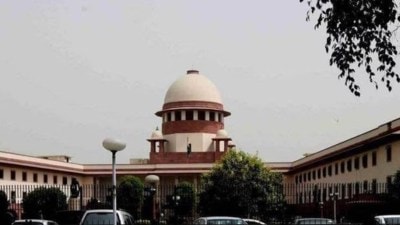A judges upbringing moulds his ideology,decisions based on law
General observations by judges during hearings should not be taken for judgments: Justice Raveendran.
There has been criticism from the judiciary that the media sensationalises judicial remarks. Cant judges,like politicians,hold a press conference to explain?
Why should we? Putting questions to counsel and making observations are part of the process of hearing. The judges need not explain their questions. Unfortunately when a comment is made in court,it is taken by the media as a decision or a view of the court. The view of the court is always expressed in writing at the end of the hearing,as an order or judgment. During the hearing,the judges put questions or make observations to elicit a response. Otherwise how do we get at the truth? If every question is sensationalised by saying that the court expressed this view or that,the litigant is demoralised. He will think that the court has already decided the matter against him. Therefore the judiciary feels that questions and remarks should not be published or given prominence. The media cannot treat every query put as an ultimate decision.
But some of these observations are sweeping…
There are subordinate courts,high courts and then the Supreme Court. Subordinate courts are basically courts of fact. They analyse the facts and give judgment. You will not therefore find sweeping observations in their orders.
In the high courts,no sweeping observations will be made in civil and criminal matters. But in writ jurisdiction in which actions of governments are challenged,or in public interest litigations… general issues crop up. Here judges make general observations to elicit answers,responses,statistics.
You should understand in what kind of cases general observations are made and in what kind they are not made. If you take a pure and simple civil or criminal case,general observations are not made. But in a PIL,which concerns the nation,necessarily and naturally,certain kinds of observations will have to be made.
But it is true that judges cannot make observations like Let there be water supply to all houses or Let there be electricity for everyone. But generally judges may say that standards should be improved,that efforts should be made to provide electricity or water to everyone,in the context of the case.
How do you address the criticism of judicial overreach?
Judicial overreach is an expression which dramatises ordinary orders of the court. It usually depends on the person referring to the decision. A person adversely affected considers it an overreach. A person who benefits out of it may consider it judicial activism. These are two sides of a coin. A farmer whose land is acquired and who is given relief considers the decision judicial activism,but the developer may consider it judicial overreach. If the executive has failed to discharge its duties and the court tries to rectify it,the aggrieved person may say it is judicial activism,but the executive may consider it judicial overreach. Courts are,however,careful in not interfering with policy matters or purely technical matters. Only when there is arbitrariness do courts tend to interfere.
Is it a weak executive that prompts the judiciary to make observations about governance?
When a court holds a government action bad and invalid,it does not mean that the executive is weak or courts are finding fault with the executive. In every branch,certain actions may be right and certain actions may be wrong. Now when some act is done wrongly,it can be identified and pointed out by a superior officer in the department,or an independent agency may look into it and point out the mistake. When it is brought to a court,the court can point out the mistake and strike it down. It does not mean the executive is bad or that it is not performing its functions or is weak. It only means that the action challenged is found to be wrong and is corrected. There is a subtle and fine distinction between finding fault and merely pointing out what is wrong and correcting the
mistake.
But it seems there have been many mistakes as the Supreme Court has been pointing out.
That means the government is doing more work. If there is no action,no fault can be found. Pointing out errors and correcting them is part of the governing process. An aggrieved person can point out the error. Higher-ups may point out the error. An audit may point out the error. Courts may point out the error. Errors are bound to occur. The problems arise when they are not rectified even when they are pointed out.
How do you feel about judicial reforms,like disclosure of assets under the RTI Act?
No comments on a case which is sub-judice.
What about the collegium system? Is there a better way of appointing judges?
At present the collegium system exists and is functioning. If there is a better way of appointing judges,nothing prevents Parliament from taking steps to implement it by bringing in the appropriate amendment.
How do you feel about the efforts of civil activists to bring the judiciary under the Lokpals ambit?
I have no comment. If you have a personal opinion of how the Lokpal Bill should be,you are entitled to it. Ultimately what Parliament is going to pass as a law will govern the matter. If what Parliament passes is challenged,the courts will examine it. Civil society wants to improve governance,the governments wants to improve governance… Let us hope there is improvement in governance.
As a pioneer of mediation,what are your thoughts on this alternative process of resolution?
I believe that if greed,anger,misunderstanding and jealousy are removed,there will be no litigation in this world. We encourage mediation in areas where there is a need for continuing relationship like husband-wife,father-son,brothers,partners,seller-purchaser… It is said that a litigation ends in two disputing parties becoming enemies,whereas mediation tries to make them friends.
The response has been promising. There are no dramatic overnight changes. It will take five to 10 years to know the effect. We have to deal with resistance from the lawyers community and the litigant public. We tell lawyers that there is need for rendering speedy effective justice at a reasonable cost,so that the litigants will have faith in the judicial system. Mediation fits the bill to achieve the objective.
Does the personal ideology of a judge come into his judicial functioning?
A judges upbringing,education,family background,experiences,instincts,convictions,beliefs mould his philosophy and ideology. But every judge tries to be impartial,neutral. Still there may be acquitting judges or convicting judges,strict judges or liberal judges. It depends upon the philosophy of the judge.
Subconsciously there may be an inclination towards personal philosophy. But consciously the judges stick to the law. If they do not,the appellate courts correct them. There may be some law which you may not like. For example,you may not agree with the death penalty. But if the case warrants the death penalty,you will have to give it. Or,if a judge is a vegetarian and an abattoir case comes up before him,whatever his personal ideology is,obviously he will not direct closure of the abattoir.
A judges ideology is personal,but his decisions are not. His decisions are based on facts,law and precedents.
Do you believe in the trend of judges taking up post-retirement assignments?
If some enactments provide that a retired Supreme Court or high court judge should head a tribunal,or be a member of a tribunal,then where is the question of believing in it or not. If you do not want such a provision,it can be deleted by amendment. All that I can say is that a retired judge should not hanker after a post-retirement job. But if he is offered a statutory position and he is inclined to work,why not accept to serve?
Photos




- 01
- 02
- 03
- 04
- 05



























